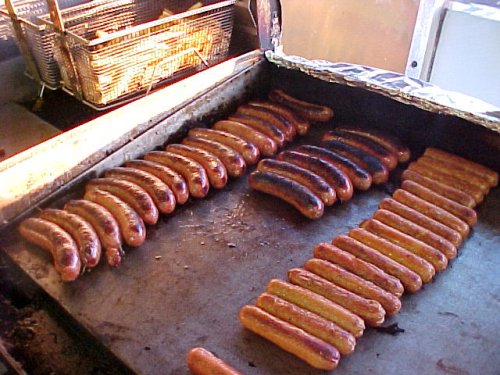WHAT I'M READING: WITHER VEGETARIANISM, LONG LIVE MALTHUS
As far as I can tell, articles in Harper's magazine aren't available online or through Nexis, so I can't provide you a link to "The Oil We Eat" by Richard Manning in the February issue. But do yourself a favor and check it out at your local newstand.
Agriculture, according to Manning, is the biggest scourge ever to be visited on this Earth. Anyone who has driven through the midwest no doubt knows just how man has completely transformed his environment through agriculture. Sure, a lot of people have heard about nitrogen fertilizers poisoning our groundwater and riverways; about genetically-modified pollen migrating across our hemisphere and mingling with indigenous corn species; and about the obesity, diabetes and other public health epidemics spawned by our agro-industrial food consumption patterns. Manning touches on all these, but sees a much, much bigger problem.
The first law od thermodynamics: energy is neither created nor destroyed. The energy contained in a barrel of Brent Crude or in a half smoke from Ben's Chili Bowl are really the same thing.

All our energy here on Earth comes from the sun and is stored for us by plants (and oil is not much more than the energy stored in really old plants). The problem is, our agricultural activities long-ago depleted the natural riches embodied in our soil, and modern extractive agricultural technologies ensure those riches are never restored. Now, in order to create enough food energy to meet the nutritional demands of an ever-growing poplulation, we need to draw down the global stock of fossil fuel energy conveniently stored for us in such hospitable places as Iraq and ANWR. The problem is, it's a negative sum venture: it takes more calories of fossil fuel to produce food than the calories embodied in said food by a factor of 10 to 1, Manning reports. That doesn't count the energy consumed in shipping varieties of food aroung the world, delivering them to warehouse stores on the outskirts of suburbs, driving out to shop there, and then storing it in our refrigerators.
The higher up the food chain you move, the less efficient the transfer of energy. This makes sense. If you grow corn and soy beans, then feed them to the pig, then eat the pig it is pretty clear that the pig is going to use up some of that energy. Vegetarians (that I know) often make a similar argument of sustainability in staking the moral high ground of their dietary choice. Not neccessarily so, says Manning. Processed food like Boca Burgers, e.g., is also deficit spending. But even if our food system produced only vegan fare, it would still wipe out vast swathes of bio-diverse flora and wildlife habitats.
So keep eating those oil burgers while the eating is good.
A final note on the inequity of this all: that energy that today is stored under the dessert of Saudi Arabia will tomorrow be stored around the necks and waists of portly Americans. And all that gas our 12 mpg Humvee's burn, that's potential food for the starving minions.
GLOBALIZE THIS!
Unconventional wisdom on global political economy.




0 Comments:
Post a Comment
<< Home